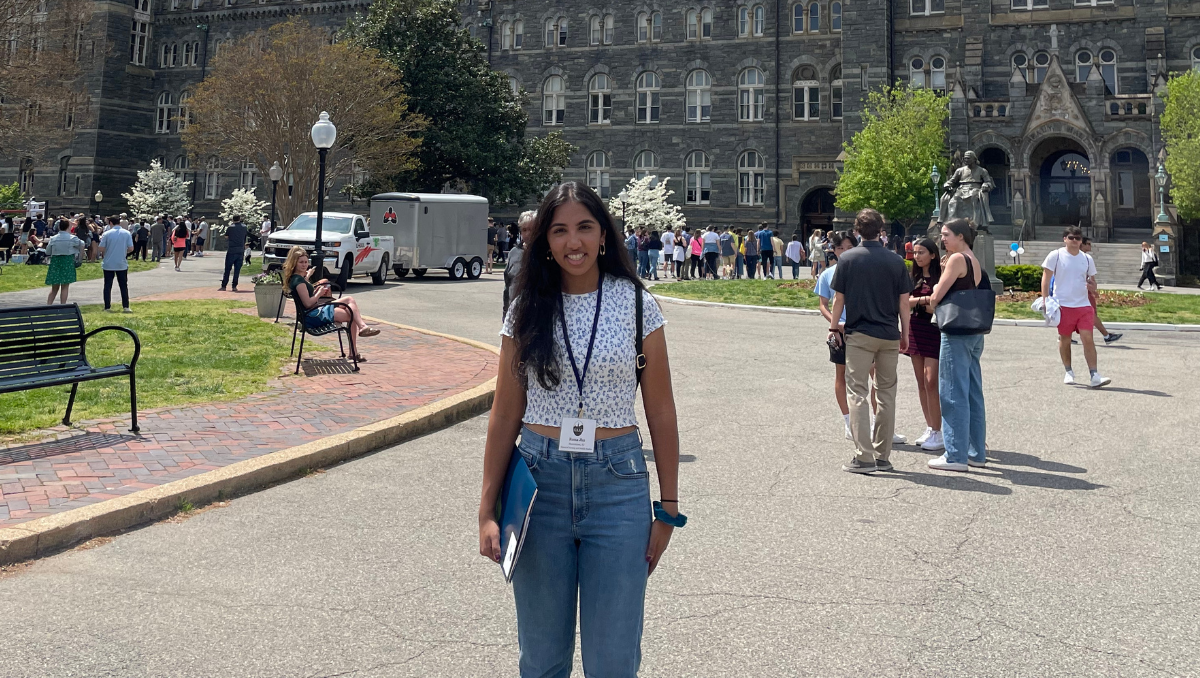HOYA Summer Medical Academy Inspires School of Health First Year Student
(July 22, 2022) — A unique Georgetown program designed to expose high school students to various fields in health and medicine led one incoming student to find a new home for her passion at the School of Health.
Roma Jha (H’26) became interested in the social medicine & public policy course, one of four tracks in the HOYA Summer Medical Academy, after her sister described her experience at a similar Georgetown program eleven years earlier.
“I found the social medicine & public policy track, and knew it was for me,” Jha said. “I wanted to get exposure to Georgetown and see what DC had to offer too.”
The course Jha attended virtually in 2021 was part of a three-week Medical Academy organized by the School of Continuing Studies (SCS) in collaboration with leaders now in the School of Health. It provided high school juniors and seniors the opportunity to interact with think tanks and organizations engaged in addressing the social determinants of health.
“The course really gives students the experience to see a range of careers in health outside of being a doctor,” said Brian Floyd, MA, assistant dean of academic affairs for SOH, who serves as the curriculum developer for the Medical Academy and course instructor of the social medicine & public policy course.
This exploration of careers at the intersection of health and policy was just what Jha was looking for.
Public Health Focus Deepened by the Pandemic
Jha hails from Moorestown, NJ. While in high school, she wrote her senior capstone project on the opioid crisis and founded an organization to raise awareness of health care issues through conversations with physicians and public health officials at high schools.
The COVID-19 pandemic only deepened her interest in public health.
“The pandemic really highlighted the disparities in health care for me, especially with gaps in insurance and people having unequal access to care,” Jha said.
Attending the Medical Academy solidified Jha’s decision to apply to Georgetown’s School of Health.
“I was already interested in applying for Georgetown but hearing Dean Floyd and current undergraduate students speak with such passion about public health topics showed me the School of Health at Georgetown was the place for me,” Jha said.
Interdisciplinary Curriculum and Careers
Floyd designed the interdisciplinary curriculum for the Medical Academy’s social medicine & public policy track to focus on identifying the complex processes that produce health inequities in populations and asking students to find solutions.
Students worked on group projects based on a specific community health need. Jha’s group looked at disparities in COVID-19 health outcomes between different Seattle populations. Students then created a health literacy campaign in response and Jha’s group focused on Seattle’s Latinx community, designing public awareness campaign about common COVID-19 prevention using music videos with Latinx artists.
“The course wasn’t just about learning about inequities,” Jha said. “We were also encouraged to create solutions.”
“The Medical Academy curriculum, like the School of Health, exposes students to a range of lecture topics on nutrition, epidemiology, and policy,” Floyd said.
“The course also showed the plethora of resources available to Georgetown students in DC – think tanks, government agencies like the National Institutes of Health, and the faculty across the university including the law school,” Jha said.
A lecture by Allison Dowling, director of the Health Justice Alliance’s cancer legal assistance and wellbeing project at MedStar Washington Hospital Center, really stood out for Jha.
“She talked about how she advocates for patients who have difficulty getting treatment because they are fighting an eviction or for food stamps,” Jha said. “Her talk showed another side of health equity for me, as well as a career in law that is also at the intersection of health, medicine and policy.”
Dowling’s work provides no-cost legal services to patients with employment, housing, finance, insurance and health care planning.
Jha was inspired by her time at the Medical Academy and is exploring a possible career in health policy and law.
Starting this fall as an undergraduate student at the School of Health, she hopes to learn more about global health diplomacy and continue to work to find solutions to health inequities.
Heather Wilpone-Welborn
GUMC Communications

